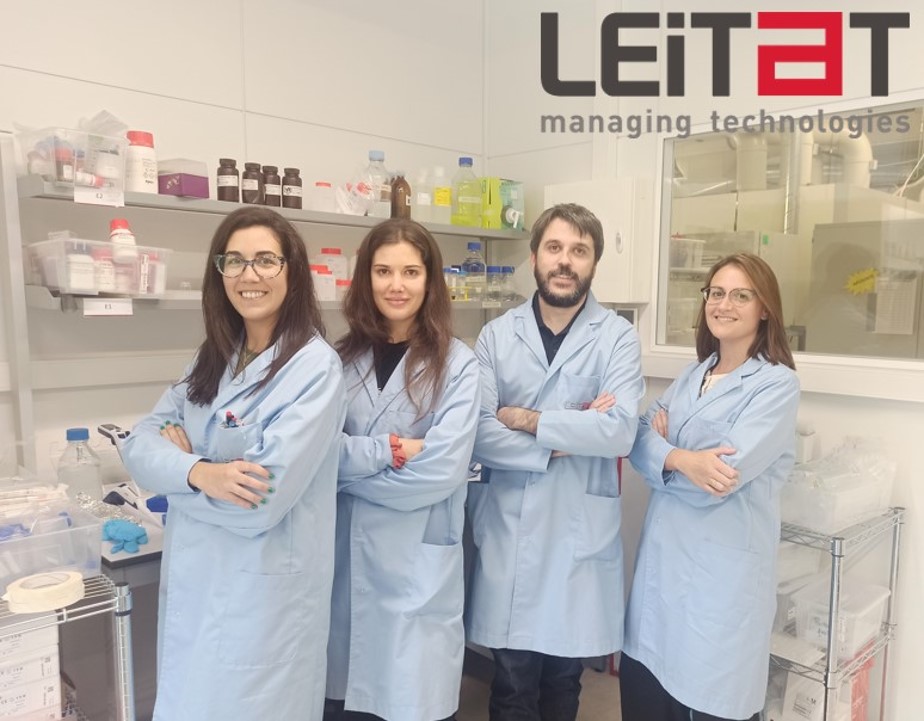LEITAT is a private technological centre located in Terrassa, Spain with more than 110 years’ experience in R&D, technology transfer and industrial innovation services. The center’s expertise brings value to a wide range of industries and sectors through dedicated R&D and tech transfer services, and it applies research in the fields of chemistry, energy, environment, materials, engineering and life sciences.
Here we introduce the OXIPRO biotech team at LEITAT (from left to right in the photo): Belen Castro, Helena Balfagon, Arnau Bassegoda and Aroa Rey Campa. Belen and Helena have both recently joined the team, and are junior researchers involved in the technical aspects of WP4 and WP5. Arnau coordinates the cosmetics case study and Aroa leads WP5, coordinates the detergent case study and is a member of the scientific committee.
This is the tip of the iceberg. The full team at LEITAT come from four distinct divisions:
- LEITAT Diagnostic Devices Group (DD) is focused on the development of microfluidic and biosensing platforms. In OXIPRO DD focuses on developing a biosensor array to monitor enzymatic activity through microfluidics. OXIPRO are exploring a novel application for enzyme-immobilized microfluidic biosensors by developing a multiplexed rapid-screening platform which will allow testing of over 20 oxidoreductase variants in parallel. This reusable platform will compare the activity and stability of different enzyme variants (substrate affinity, effect of inhibitors, temperature and pH), benefiting from the advantages of carrying out a continuous biocatalysis.
- The fast-moving consumer goods (FMCG) division of LEITAT is specialized in R&D in Detergency and Cosmetics sector. FMCG provides detergency, cosmetics and cleaning & disinfection solutions for general household and I&I (industrial and institutional) industry. In OXIPRO, the FMCG division is participating in the integration of enzyme innovations in a consumer product, collaborating in the innovation case for detergency products. The investigation of industrial implementation is carried out together with the industry partner and is focused on the study of stability of the optimized novel enzymes overtime against surfactants and other enzyme present in detergent formulation, the research of different formulation strategies to maximise enzymatic stability, and the assessment of the enzyme-based formulations performance in a relevant environment (antimicrobial activity, washing performance, textile integrity). In this way, FMCG is involved in the proofs of concept, process, and application for the design of a novel liquid laundry hygienizing product.
- The Human and Environmental Health and Safety (HEHS) division of LEITAT, enclosed within the Circular Economy Department, is structured in two main research areas: Materials Safety, and Nanotoxicology & Risk Assessment. The main objective of the HEHS group focuses on offering technological support to different industrial sectors at different levels, to ensure that their products are safe for human health and for the environment. The main activities include: i) Monitoring of physicochemical properties of nanomaterials, additives and other contaminants during the different; ii) Human and Environmental exposure assessment; iii) Hazard and impact assessment of xenobiotics and nanomaterials (toxicological assessment in vitro, in vitro biokinetics in a broad variety of cellular models, and in vivo studies in rodents); iv) Environmental Risk Assessment of emerging contaminants, metals and nanoparticles; v) Industrial safety assessment support, from the Regulatory Affairs’ point of view; and vi) Training services to help companies complying with EU legislation. In OXIPRO, the HEHS Department will focus on the assessment of the potential risks which could be posed to human health by the developed liquid detergent formulations within the project.
- The biotechnology group focuses mainly on two activities: biocatalysis and bioprocesses. It combines the use of enzymes and microorganisms with molecular biology and bioinformatic tools for strain engineering and protein development. It works on the production of new ingredients, fragrances, flavours, probiotics, antimicrobials, biosurfactants, and biopolymers etc., as well as improving the bioprocesses. Its role in OXIPRO is very broad, starting from the selection, expression, and purification of the enzymes, followed by the analysis of their activity, the development of the process/method and the study of compatibility of the enzyme in the formulation or process.
For more information about LEITAT, contact Aroa Rey Campa
